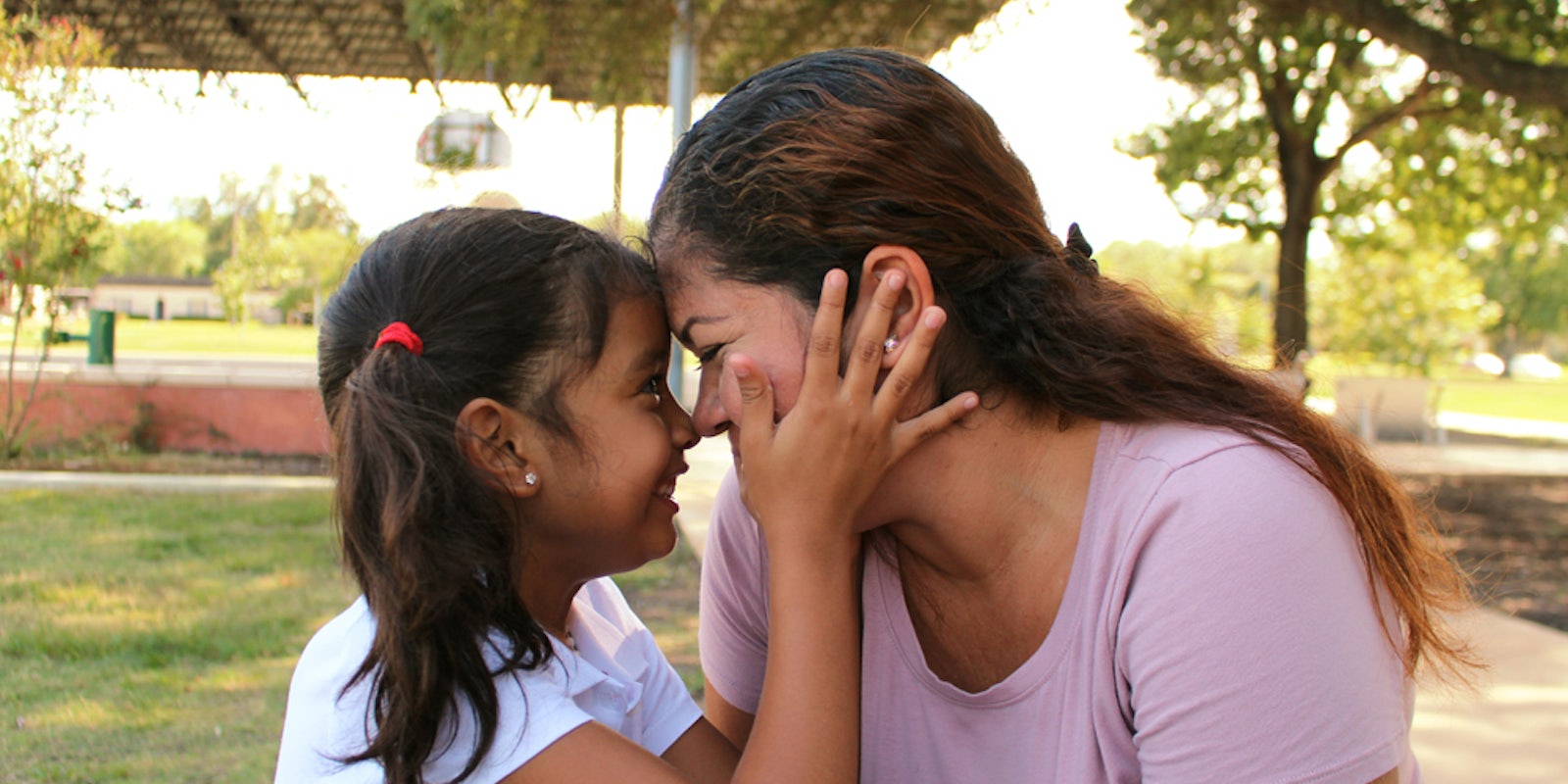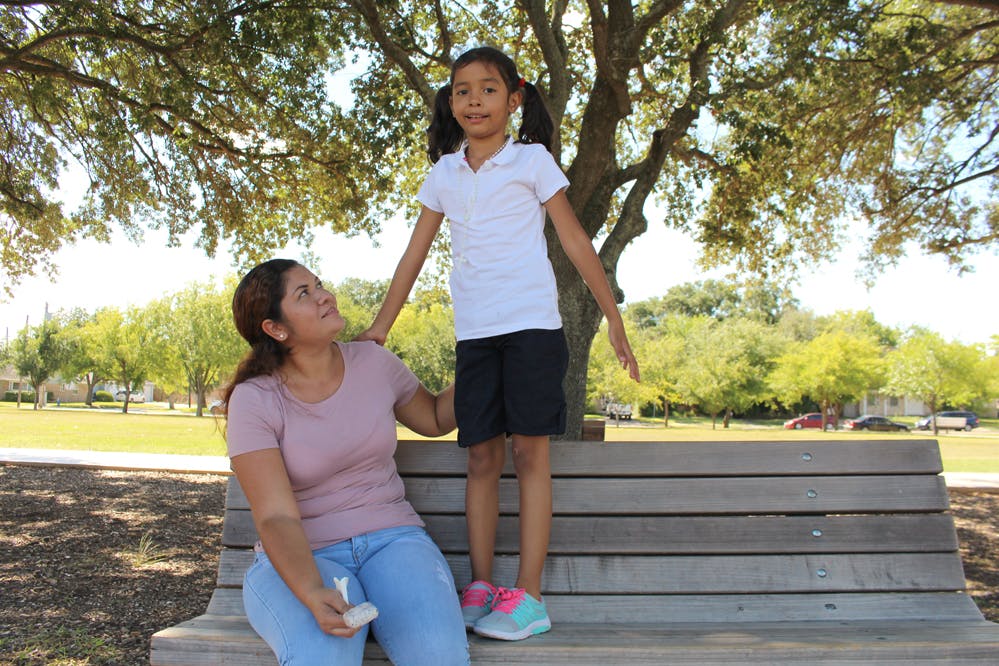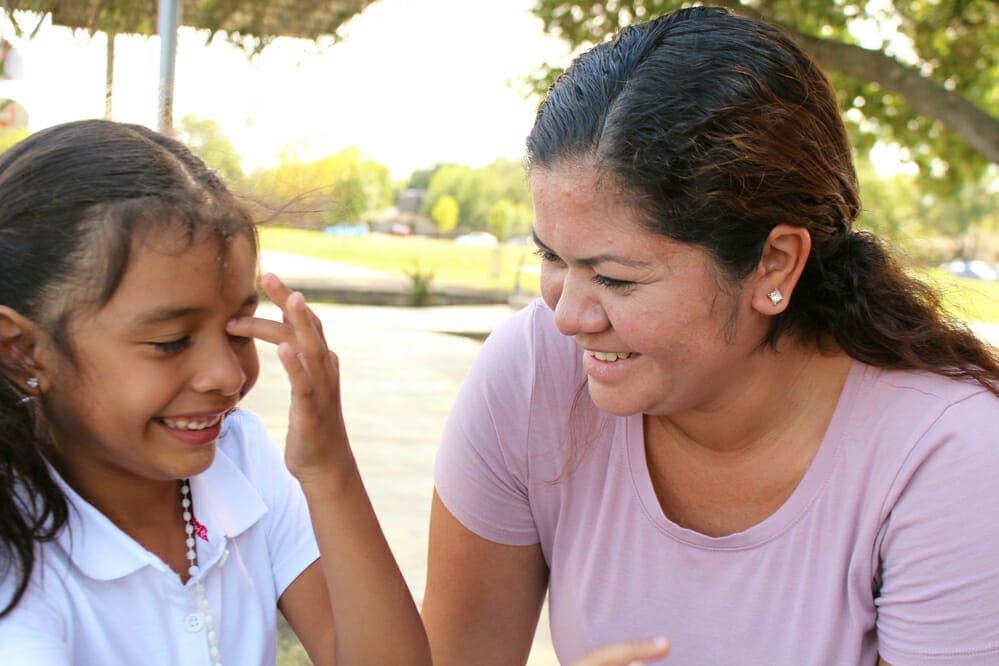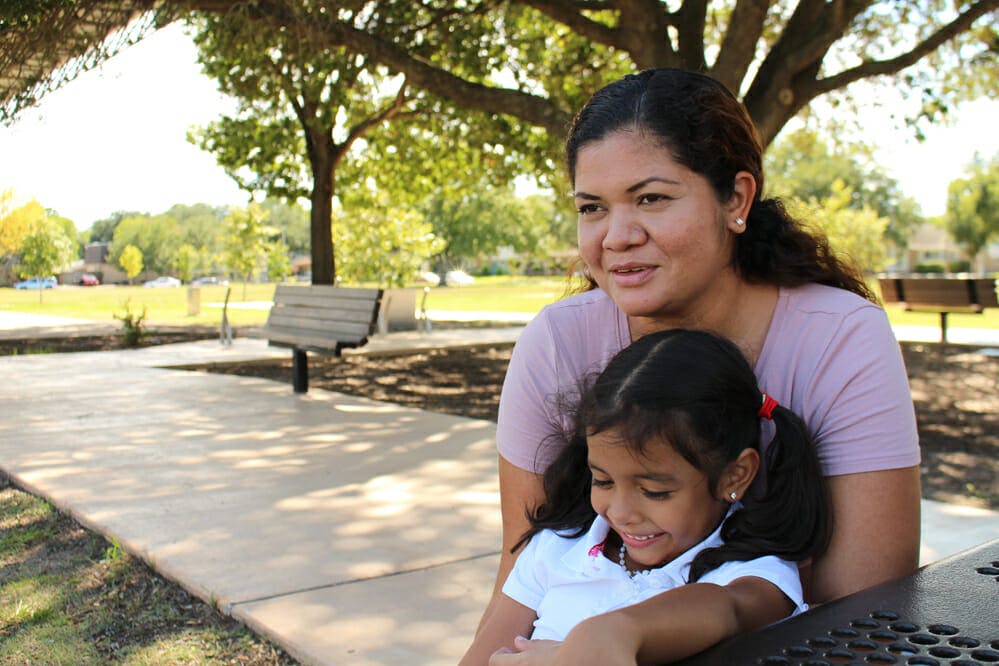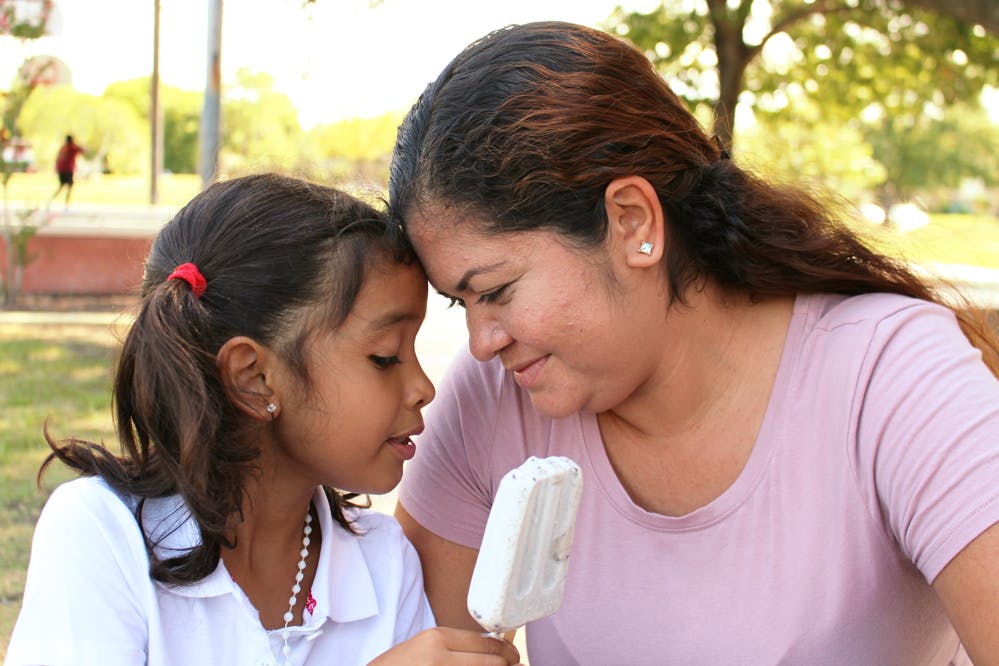Alisson Ximena Valencia Madrid is antsy. During our hour together, the 6-year-old wants to get up, move, color, eat. She roams around the park picnic table, huffs to herself as she digs through her emoji-covered lunchbox, and stands on the bench while her mom sits to take a photo. You could chalk up her fidgeting to simply being a ready-to-run first-grader who has just gotten out of her fourth day of school in a new country. That is, if all of her sudden movements and gesturing didn’t give her mother pause, especially when they’re discussing the month they spent separated.
Ximena’s itch for a distraction is understandable, given the attention she and her mother, 29-year-old Cindy Alinette Madrid Henriquez, have received over the past three months. She’s become an involuntary viral star, and her heartbreaking audio while in custody of the U.S. government became a tipping point in President Donald Trump’s war on immigration. Now in Houston, Ximena and Cindy are slowly getting acclimated.
Their journey to this afternoon in the park began with a month-long trip through Mexico from El Salvador, arriving at the U.S. border on June 12. As they were sitting in the cages of the Port Isabel Detention Center the following day, an agent called Ximena’s name. Together, Ximena and Cindy stood up and walked toward the agent, who called Ximena’s name again, before grabbing her and walking away. Ximena turned around as she was being escorted down the hallway, a baffled look on her face as she burst into tears. Her mother’s cries soon followed. That’s when another agent came up from behind Cindy and told her to come with them. She would see Ximena after court, the agent said. Cindy assumed they would go to court that day, so she followed.
Cindy continued to be held at Port Isabel, while Ximena was transferred to a child detention center operated by private company Southwest Key in Phoenix, more than 1,000 miles away. Ximena didn’t hear her mother’s voice for nine days, and didn’t see her for a month after they were taken from one another.
Ximena was one of the more than 2,600 children separated from their family members under the Trump administration’s “zero tolerance” policy. Announcing the policy in April, Attorney General Jeff Sessions vowed that anyone who came into the U.S. unauthorized would be prosecuted. This meant that families would be split up, with adults in ICE custody and children placed in custody of the Department of Health of Human Services’ Office of Refugee Resettlement, then child detention centers, commonly referred to as shelters. “If you don’t like that, then don’t smuggle children over our border,” Sessions said in May.
It was five days after being separated from her mother when Ximena indirectly sent a message to the American people: These affected migrant children were frightened, confused, and desperate to be with their families once again. In an audio recording published by ProPublica, seven-plus minutes of separated children screaming and crying for their parents, little Ximena is heard gasping between cries, begging a border patrol agent to allow a consular worker to call her aunt to come get her—she had memorized her aunt’s phone number during the last leg of the trip with her mother. Even more astonishing in the audio was the seemingly cruel response from the border patrol agent who had told the children to stop crying: “Well, we have an orchestra here,” he told the children in Spanish. “What’s missing is a conductor.”
The anonymous person who recorded Ximena from inside the processing facility “heard the children’s weeping and crying, and was devastated by it,” according to civil rights attorney Jennifer Harbury, who received the audio and gave it to ProPublica, which published the damning media less than a week after Ximena had been taken from her mother. (Harbury did not return repeated requests for comment.) Ximena told the Daily Dot that she had originally been denied her request to call her aunt, but later, as heard on the recording, a consular official offered to finally make the call.
Speaking to ProPublica, Ximena’s aunt said her niece cried and begged to come get her. “It was the hardest moment in my life,” her aunt said. “Imagine getting a call from your 6-year-old niece… She says, ‘I promise I’ll behave, but please get me out of here. I’m all alone.’”
While there was nothing her aunt could do, Ximena’s cries did end up helping the family separation crisis at large. Across Twitter and Facebook, users shared the audio, expressing earnest concern for the visceral pain caused by the family separations under the Trump administration, and urging others to process the viciousness happening along the country’s southern border. The children’s cries were played in cars on NPR, in homes on CNN. Activists played the audio outside of a Trump Hotel fundraiser, Congress members on the Senate floor, and reporters inside White House briefings. Lawmakers called the recording horrific. Listeners commented that just hearing the kids’ distresses made them sick. After weeks of stories of overcrowding and documented cases of abuse coming out of child detention facilities, the ProPublica audio felt like a critical moment. No one could turn away. Not even the president could ignore the public outcry any longer.
On June 20, two days after the recording of Ximena went public, President Trump signed an executive order directing his administration to stop separating families on the border. On June 26, a week after, a federal judge gave the Trump administration 30 days to reunite all separated children with their family members.
To the family’s attorney, the voices of Ximena and the other children made the difference.
“Nobody knew what was going on down here, how they were separating kids, had it not been for her,” the family’s lawyer, Thelma Garcia, tells the Daily Dot. “Had her voice not come out and Jennifer Harbury not gotten that tape and her giving it out to ProPublica, and CNN picking it up, had it not exploded through her little voice, people who are not involved in this, outside of this area, would not have known what was going on.”
Dramatic moment on the Senate floor this afternoon as Sen. Menendez plays audio of children crying.
— ABC News Politics (@ABCPolitics) June 19, 2018
“It’s time this Senate have its conscience pricked, that it moves to action and that it challenges the president on this horrific policy.” https://t.co/k1GcDAivBw pic.twitter.com/ABo5wzyEeh
I played the audio of children separated from their parents at a US Customs and Border Protection facility that was published by @ProPublica today at the White House briefing. Officials failed to adequately and truthfully answer questions about the policy. https://t.co/M7jyZQUwwK
— Olivia Nuzzi (@Olivianuzzi) June 18, 2018
LIVE: Activists are outside a Trump Hotel fundraiser blasting leaked audio of children crying at a detention center. https://t.co/NWilIiWezz
— Alejandro Alvarez 🫡 (@aletweetsnews) June 19, 2018
Two and a half months after the audio was released, sitting at a picnic table outside her new school, Ximena says she’s listened to the recording, just once. But she remembers the moment captured in the audio: After being told she couldn’t call her aunt, an agent had made a comment about her face—about how red her little face was. Was she red out of frustration, anger, nervousness? From pure sadness, she says.
Minutes later, Ximena unzips her sparkly lunchbox, pouting slightly and letting out an exhausted whine at its emptiness. She’s hungry. I run to my car in hopes Ximena might like the trail mix I brought for the ride to Houston. She downs half the bottle of cold water I give her, and her eyes light up after her mother reads the ingredients off the trail mix packet. She says she likes it, but one bite of dried berries proves otherwise. She puckers her lips and pushes the packet to the side. She’d rather hold out for something better.
. . .
Everything is different in the U.S., Ximena says. But it’s precisely those differences that led Cindy to want to seek asylum with her daughter in the States, where two of her sisters have lived for 13 and three years, respectively. The latter sister has a daughter of her own and is also applying for asylum. She’s the one who told Cindy to have Ximena remember her phone number.
Cindy says that prior to their arrival, her sisters had tried to prepare them for life in the U.S., but they didn’t know about the separation policy. In fact, this was the mother and daughter’s second attempt to get to Houston. The first time, Cindy and Ximena were apprehended by immigration officials in Saltillo, Coahuila, in Mexico, about three hours southwest from the U.S.-Mexico border and a 30-hour drive from their city of Armenia, El Salvador. That time, they were deported.
Cindy waited only weeks before attempting to come to Houston a second time—the persecution was too great, their life in El Salvador too perilous. Garcia says that someone who had caused the Madrid family a lot of problems, someone who had actually killed a family member of Cindy’s, had attempted to snatch Ximena from Cindy’s arms while they were out walking. Cindy wasn’t going to stand for it. They simply couldn’t stay.
When Ximena and Cindy were finally reunited in Houston, their story caught the nation’s attention once again. CNN recorded the moment the pair left the airport, holding hands; the 6-year-old was beaming as family members, new toys in hand, surrounded her. “Sonrisas! Big smiles!” a man exclaims at her toothy grin while onlookers clap. In another clip, Ximena, sitting safely in her mother’s lap, sticks her tongue out and smiles as she waves goodbye to the cameras. Cindy gently brushes Ximena’s bangs away from her face, her own face focused on her daughter.
BREAKING: Remember that audio we published of 6-year-old Alison Jimena Valencia Madrid begging a border agent to call her aunt after they separated her from her mother? Here’s video of that little girl being reunited with her mother this morning, after a month and two days. pic.twitter.com/q1plhAHrHQ
— ProPublica (@propublica) July 13, 2018
Ximena’s excited reaction contrasts starkly from other migrant children who have been recorded being reunited with their parents. In one video, a little girl’s eyes look empty as her mother embraces her, falling to her knees and crying for her forgiveness; the girl, with choppy bangs and a loose ponytail, eventually kneels and pats her mother as if to console her. In another, a father tears up as he approaches his son in the airport, hugging him tightly as the boy’s hands remain clasped, arms unreaching. But Garcia, who had driven Cindy to Houston for the reunification, says Ximena immediately ran to her mother upon first glance.
This lack of hesitation is something Cindy attributes to their lifelong closeness: It’s always been the two of them supporting and learning from each other, ever since Ximena’s father left them. Since their reunification, Cindy says they’ve been bridging the separation with time out and about in the city: ballet and music classes (much like Ximena’s beloved dance classes in El Salvador), playing and having pizza (Ximena’s favorite). After our chat, they are going out for tacos.
“We’ve been trying to do activities together, trying to make up for lost time,” Cindy says. “It wasn’t a lot of time, but it was extremely valuable because we weren’t used to being separated for even a moment.”
Ximena says she cried on her first few days of school and felt sick to her stomach. But being away from her mother has gotten easier, day by day. Here, having just wrapped up her fourth day of school, she feels OK. When told how brave she is, Ximena says very matter-of-factly, “That’s what they tell me.”
Ximena grows bored with the questions, knowing that others are talking about her, waiting to speak when spoken to. After a short solo walk around the park, she makes a show of struggling to yank a plastic folder from her backpack and begins to color an assignment using a brick-sized box of twistable crayons. “Nono no!” she gasps. She had colored in the band of a diamond ring an orange-brown. Her mother peers over her daughter’s shoulder and whispers a suggestion. Ximena dutifully corrects it with white.
The “fame,” if not the burden of being the face of a reviled public policy, has followed Ximena after being released from the detention facility. On one plane ride, Cindy says a fellow passenger recognized her and gave her some candy. Another time, Cindy had taken Ximena to the store to buy a pair of earrings and a necklace, and the jeweler recognized her as “the little girl on the news.” The family bought the earrings, but the jeweler gave Ximena the necklace at no charge. Ximena says she was shy at first and wasn’t expecting this kind of attention, but it’s also given her an opportunity to make new friends. Meanwhile, her classmates don’t have a clue who she is, something she finds equally OK.
Cindy, too, is still recovering from her daughter’s minor celebrity. Not even in her wildest dreams would she have thought that her first-grader could have made such an impact on a country, she says. Cindy, whose initial asylum hearing was moved from August to November, isn’t able to work until her asylum application passes the 150-day mark. So she spends her days at her sister’s home, helping around the house, browsing the internet for new recipes to try, and taking online English classes. A GoFundMe campaign by Together and Free, an organization now associated with Texas-based nonprofit RAICES, paid for Cindy’s bond from ICE detention, but Garcia’s firm says Cindy is not receiving any additional financial support outside of helping her sister in exchange for assistance.
Cindy says she doesn’t give much thought to ProPublica’s recording, unless she’s by herself, alone. Then she begins to think about the circumstances of Ximena’s time at the facility. There’s a lot she doesn’t know about what it was like for her daughter, and what she actually experienced.
Ximena hasn’t talked about it yet, and on the park bench, as her mother voices her internal dialogue, Ximena begins listing off her evening’s duties, her eyes slowly wandering. She has a lot of homework. She has some reading to do. “Right now, I don’t want to remember,” she says finally, her voice softening.
Garcia’s assistant tells me that both Cindy and Ximena have seen a psychiatrist in Houston, provided free by the organization that paid Cindy’s bond. The legal team also arranged a recent evaluation for the family, and for another one in November to possibly submit to the court “for humanitarian grounds.” According to the American Academy of Pediatrics, one of hundreds of organizations that have demanded the Department of Homeland Security end separations, these “highly stressful experiences” can “cause irreparable harm to lifelong development by disrupting a child’s brain architecture.” Children removed from their parents no longer have a “buffer” to mitigate stress and other impacts on health, which can contribute to depression, post-traumatic stress disorder, heart disease, and other conditions. Compared to children yet to be reunited with their parents, Ximena was detained for a relatively short time. But according to the academy, even brief detention can cause children long-term mental health risks and psychological trauma.
While Cindy still has questions, she’s putting her energy toward preparing for the next stage of their lives, and, like Ximena, wants to move forward. Ximena’s seventh birthday was on Sept. 10, and the family planned on having a party at school, surrounded by her classmates. Cindy was saving up money to buy her a life-like baby doll, even if “it reminds her [mom] of Chucky,” Ximena impressively references.
Minutes later, Ximena screams mid-thought for the paleta man as he rolls up with his cart. Cindy chuckles, nodding approvingly. As Ximena’s ice cream drips down her popsicle stick, Cindy switches between posing for the camera and helping her daughter, taking small bites from the bar, the treat turning runny in the Texas heat.
Cindy knows that people aren’t always as kind as the thousands who shared and commented on the recording of her daughter’s voice. But she says that reading the positive thoughts gave her and Ximena the strength to go on. Even Ximena, slow to warm up, shy but funny, knows what she wants to tell Trump if she had the opportunity. But not before adding the disclaimer that she wouldn’t tell him a thing, because he doesn’t speak Spanish.
“I would tell him to stop the separation because a lot is happening with hard cases and he makes it even harder…and the lawyers can’t do anything,” Ximena says.
As of Sept. 13, more than seven weeks after the Trump administration’s July 26 deadline to reunify all separated families, 211 children have yet to be reunited with family members. Parents of 165 of them have already been deported. Of these children, six are under the age of 5.
With translation assistance from Christine Bolaños.

